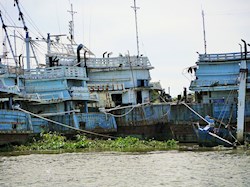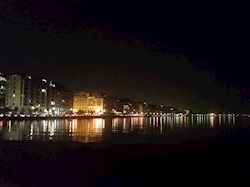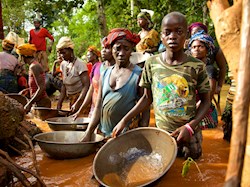As we continue on our journey for peace and justice it is important to remember that oppression is complex and multifaceted. Individuals experiencing one injustice may also be experiencing another injustice at the same time. A person who is African American and has financial resources experiences racism differently than a person who is African American and living through poverty. It is those people who experience multiple forms of oppression that we must not forget as we work for liberation for all.
Over the past few weeks, President Trump’s executive orders have increased deportations and detentions; spreading fear amongst the immigrant community. This fear is felt even more deeply amongst foreign nationals who were brought to the United States against their will: the victims of human trafficking.
40.6% of the human trafficking cases reported to the National Human Trafficking Hotline in 2016 that identified nationality involved foreign nationals (1,417 cases). Many cases of human trafficking are not reported, so the extent of the problem is truly unknown. The U.N.’s Global Initiative to Fight Human Trafficking estimates 270,000 victims are exploited in industrialized countries like the United States.
The United States currently offers three types of legal protection for survivors of human trafficking: Continued Presence, T visas, and U visas. These programs allow survivors who are foreign nationals to stay in the country during the investigation and prosecution of their traffickers. For those who are granted visas, permanent legal residency is a possibility.
Even with these safeguards in place, many survivors of trafficking feel hesitant to claim the protections they are offered. One of the executive orders signed January 25 reads “In executing faithfully the immigration laws of the United States, the Secretary of Homeland Security… shall prioritize for removal those aliens… who have abused any program related to receipt of public benefits.” Even though they rightfully qualify for legal protection and other services, there is a fear that the executive order will be used to target them.
In addition, survivors who were arrested of a crime they committed while under the control of their trafficker might feel fear of deportation. The order prioritizes those who “have been convicted of any criminal offense; have been charged with any criminal offense, where such charge has not been resolved; and gave committed acts that constitute a chargeable criminal offense” for deportation. In Ohio, there are laws and protections for survivors with criminal records but no federal law has been enacted.
If survivors of trafficking are afraid, those who are still being trafficked are even more afraid to ask for help to get out of their situation.
The January 25th internal enforcement executive order is not the only order that impacts survivors of human trafficking who are foreign nationals. The March 6th executive order impacting six Muslim-majority countries forces survivors to choose between staying in the United States to fight for justice or returning home to see their families. Most survivors need to stay in the United States so they can be available and present for legal proceedings. If they choose to leave the U.S. and are from one of the six countries that are banned, it is unclear if they will be able to return.
Last and probably not least, precious time and resources are also being used to label and charge immigrant parents as “human traffickers” if they pay to have their children brought to live with them in the United States. A memo written by the Secretary of the Department of Homeland Security reads “Regardless of the desires for family reunification or conditions in other countries, the smuggling or trafficking of alien children is intolerable.” The memo calls for the parents to be deported and/or charged with trafficking. Human trafficking is defined as the use of “force, coercion or deception,” tactics not used by smugglers paid to reunite families.
As we continue to move forward, policies and programs must reflect the needs of those who stand at the intersections of oppression. Martin Luther King once quoted Emma Lazarus saying, “No one is free until we are all free.”
Note: This article was originally published on March 8, 2017 on the Intercommunity Justice and Peace Center's website.
Topics:
Forced Labor,
Policy Making












